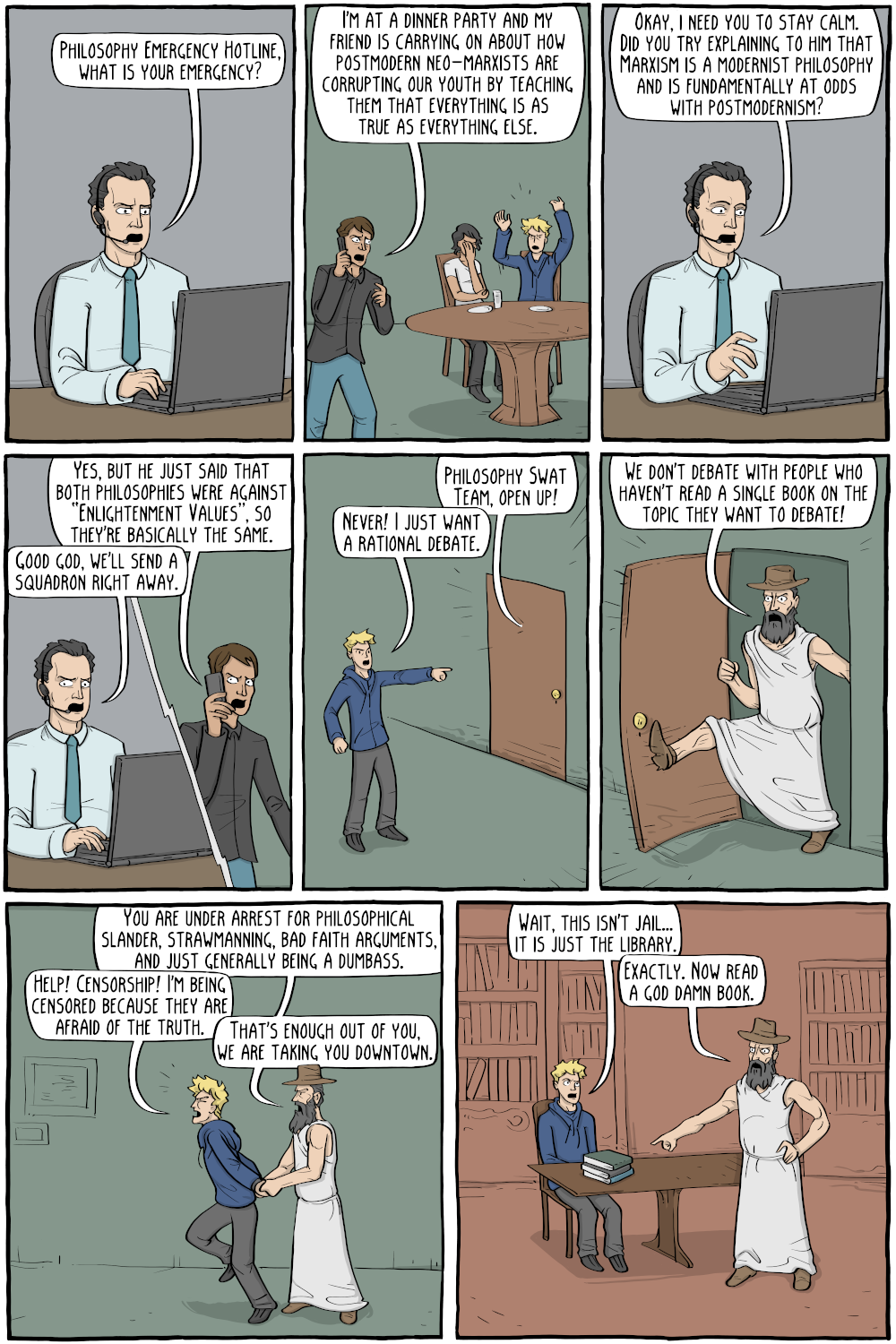PostModern Neo-Marxism?
Full Disclosure: I am not a Marxist or a Postmodernist.

Full Disclosure: I am not a Marxist or a Postmodernist.
This comic, by Existential Comics, is wrong.
In so far as the antagonist in the comic represents a completely ignorant position which I have encountered - point taken.
This article is in no way a defence of of conspiracy theory and fear mongering in the spirit of McCarthyism.
One prominent person who has made a claim similar to the comic comes to mind. They were not able to name a single "Postmodern Neo-Marxist". The professor (Jordan Peterson) who sold pop books about half baked nonsense showed his complete ignorance of the topic in debate with an actual Marxist (Slavoj Zizek).
Let's see if we can do better then that self aggrandizing professor and actually identify a textual tradition of the so called "Postmodern Neo-Marxism". Which involves a series of common conflation of various traditions of of Philosophy - but the existence of which can not be dismissed outright.
To keep this quick and easy I'll just be citing mostly Wikipedia. So, the quotes are not perfect illustrations but will do for the sake of the argument.
Done is better than perfect.
Neo-Marxism (Wikipedia)
"Neo-Marxism encompasses 20th-century approaches that amend or extend Marxism and Marxist theory, typically by incorporating elements from other intellectual traditions such as critical theory, psychoanalysis, or existentialism (in the case of Jean-Paul Sartre)."
Here we already find direct contradiction to the comic, but in order to make this easy I need to introduce a new term.
Post-Marsixm (Wikipedia)
"Post-Marxism is a trend in political philosophy and social theory which deconstructs Karl Marx's writings and Marxism proper, bypassing orthodox Marxism."
The authors below are considered to be "Post-Marxist" according to Wikipedia.
Lyotard (Wikipedia)
"This involves, for example, an incredulity towards the metanarrative of human emancipation. That is, the story of how the human race has set itself free that brings together the language game of science, the language game of human historical conflicts and the language game of human qualities into the overall justification of the steady development of the human race in terms of wealth and moral well-being."
"This becomes more crucial in Au juste: Conversations (Just Gaming) (1979) and Le Différend (The Differend) (1983), which develop a postmodern theory of justice. It might appear that the atomisation of human beings implied by the notion of the micronarrative and the language game suggests a collapse of ethics."
The incredulity towards the metanarrative is referenced by the comic as making Marxism and Postmodernism as fundamentally at odds. And, that would be relevant if Post-Marxism needed to be in line with Orthodox-Marxism - it doesn't.
Laclau (Wikipedia)
"...the meaning of something is never pre-given but is, instead, constructed through social practices. Laclau subsequently used this account of discourse to re-consider the nature of identity, arguing that all political identities are discursive - even if they are experienced by individuals as 'natural' (even to the point where one's identity is not recognised as an identity). For example, though an individual may think that they are just 'born male' this is, for Laclau, not the case: 'maleness' is a socially constructed category that has no innate meaning."
For those with essentialist views of gender is probably pretty much the same thing as saying "everything is as true as everything else". Argument against the separation of the concepts of Gender (performative) and Sex (biological) is now a rallying point of conservatives attacks on relativism. So, there's some clear context to the words of the comic antagonist.
A lot of people conflate post-structuralism with post-modernism - which isn't really a well defined thing. Many would say "If it sounds like a duck..."
Baudrillard (Wikipedia)
Baudrillard claims that our current society has replaced all reality and meaning with symbols and signs, and that human experience is a simulation of reality... Baudrillard believed that society has become so saturated with these simulacra and our lives so saturated with the constructs of society that all meaning was being rendered meaningless by being infinitely mutable; he called this phenomenon the "precession of simulacra".
Third order, associated with the postmodernity of Late Capitalism, where the simulacrum precedes the original and the distinction between reality and representation vanishes. There is only the simulation, and originality becomes a totally meaningless concept.
"The transition from signs which dissimulate something to signs which dissimulate that there is nothing, marks the decisive turning point. The first implies a theology of truth and secrecy (to which the notion of ideology still belongs). The second inaugurates an age of simulacra and simulation, in which there is no longer any God to recognize his own, nor any last judgment to separate truth from false, the real from its artificial resurrection, since everything is already dead and risen in advance."
Baudrillard’s first three works can thus be read in the framework of a neo-Marxian critique of capitalist societies. One could read Baudrillard’s emphasis on consumption as a supplement to Marx’s analysis of production and his focus on culture and signs as an important supplement to classical Marxian political economy, which adds a cultural and semiological dimension to the Marxian project. But in his 1973 provocation, The Mirror of Production(translated into English in 1975), Baudrillard carries out a systematic attack on classical Marxism, claiming that Marxism is but a mirror of bourgeois society, placing production at the center of life, thus naturalizing the capitalist organization of society.
Althusser (Wikipedia)
"Althusser believes that Marx's work is fundamentally incompatible with its antecedents because it is built on a groundbreaking epistemology (theory of knowledge) that rejects the distinction between subject and object... In this view, the validity of knowledge does not lie in its correspondence to something external to itself. Marx's historical materialism is a science with its own internal methods of proof.
From Althusser we get the Rethinking Marxism project, which is currently active. I didn't find the quotes I was looking for, so I might add more here if I run across the right quote.
Note: an appeal to the pseudoscientific nature of Marxism was not convincing to the European Commission of Human Rights when they upheld the ban in the 1957 case Communist Party of Germany v. the Federal Republic of Germany.
The issue of "everything is as true as everything else" seems taken directly from Richard Rorty (Wikipedia).
'Relativism' is the view that every belief on a certain topic, or perhaps about any topic, is as good as every other. No one holds this view. Except for the occasional cooperative freshman, one cannot find anybody who says that two incompatible opinions on an important topic are equally good. The philosophers who get called 'relativists' are those who say that the grounds for choosing between such opinions are less algorithmic than had been thought.
'In short, my strategy for escaping the self-referential difficulties into which "the Relativist" keeps getting himself is to move everything over from epistemology and metaphysics into cultural politics, from claims to knowledge and appeals to self-evidence to suggestions about what we should try.'
In postmodernism (Wikipedia)
The term "relativism" often comes up in debates over postmodernism, poststructuralism and phenomenology. Critics of these perspectives often identify advocates with the label "relativism".
These perspectives do not strictly count as relativist in the philosophical sense, because they express agnosticism on the nature of reality and make epistemological rather than ontological claims.
Kuhn (Wikipedia)
...the notion of scientific truth, at any given moment, cannot be established solely by objective criteria but is defined by a consensus of a scientific community. Competing paradigms are frequently incommensurable; that is, they are competing and irreconcilable accounts of reality. Thus, our comprehension of science can never rely wholly upon "objectivity" alone. Science must account for subjective perspectives as well, since all objective conclusions are ultimately founded upon the subjective conditioning/worldview of its researchers and participants.
It is clearly wrong to say that Marxism and Postmodernism are incompatible, and traditionally minded people have good reason to be skeptical of the metanarative of Postmodernism - and Marxism.
In this article, Post-modernism and Marxism
According to Richard Osborne (1987, p. 12), the unifying project of post-modernism is 'contesting the dominant definition of things, the consensus, whether political or academic, and interrupting the flow of apparent realities.
Post-modernism is reflected in the post-Marxist socialist politics of the 'new social movements' or 'socialist pluralism' (Laclau and Mouffe, 1985; Bowles and Gintis, 1986). It expresses itself in Foucault's micro-politics and the new politics of localities. It can be found in the economics of post-Fordism, in flexible integration as an industrial strategy (Cooke, 1987), or in localities research. (These are probably the most prominent areas in which Marxist geographers encounter and generate a post-modern discourse.) It can be unquestionably Marxist (see, for example, Eagleton, 1986) or militantly anti-Marxist (Aronowitz, 1981). It can be serious about social issues or frivolous and individualistic.
But, that doesn't make scapegoatism reasonable.
Nothing I've said is a defense of the "Cultural Marxism" Conspiracy Theory! (Wikipedia)
'In the Dialectic of Counter-Enlightenment: The Frankfurt School as Scapegoat of the Lunatic Fringe (2011), the historian Martin Jay said that Lind's documentary of conservative counter-culture, Political Correctness: The Frankfurt School (1999), was effective propaganda, because it:
"spawned a number of condensed textual versions, which were reproduced on a number of radical, right-wing sites. These, in turn, led to a plethora of new videos, now available on YouTube, which feature an odd cast of pseudo-experts regurgitating exactly the same line. The message is numbingly simplistic: All the 'ills' of modern American culture, from feminism, affirmative action, sexual liberation, racial equality, multiculturalism and gay rights to the decay of traditional education, and even environmentalism, are ultimately attributable to the insidious intellectual influence of the members of the Institute for Social Research who came to America in the 1930s.
In the article titled Collectivists, Communists, Labor Bosses, and Treason: The Tea Parties as Right-wing, Populist Counter-subversion Panic, Chip Berlet identifies the Cultural Marxism conspiracy theory as an ideological basis of the Tea Party movement within the Republican Party. The Tea Party identifies as a right-wing populist movement; its claims of social subversion echo earlier white-nationalist claims of racial, social, and cultural subversion. The economic elites use populist rhetoric to encourage counter-subversion panics. Thus, a large, middle-class white constituency is politically deceived into siding with the ruling-class social and economic elites to defend their relative and precarious socioeconomic position in the middle class. Cultural scapegoats, such as mythical conspiracies claiming that collectivists, communists, labor bosses, and nonwhite citizens and immigrants are to blame for the economic, political, and social failures of free-market capitalism. In that manner, under the guise of patriotism, economic libertarianism, traditional Christian values, and nativism, right-wing accusations of Cultural Marxism defended the racist and sexist social hierarchies specifically opposed to the "big government" policies of the Obama administration.'





